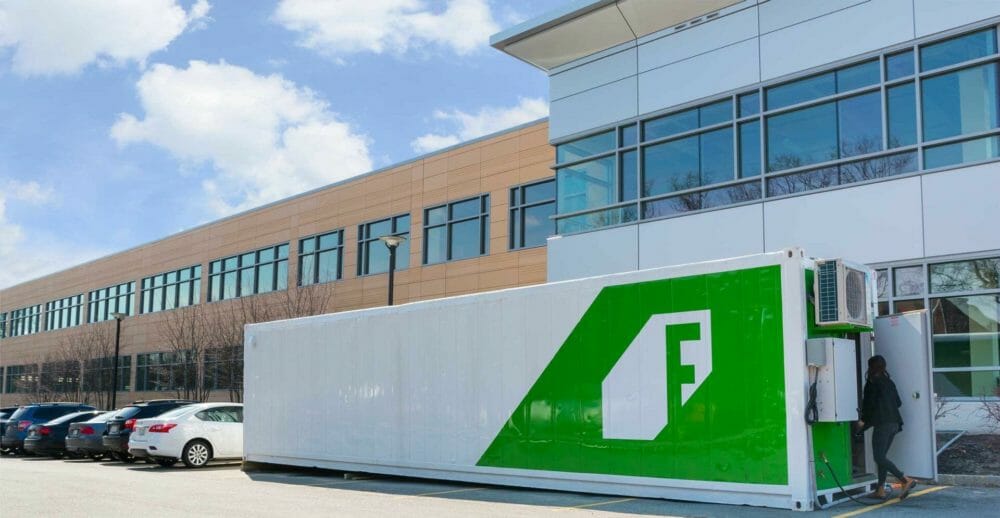When a major foodservice player like Sodexo calls up your relatively young startup to ask whether you’d be interested in providing indoor ag services for their university clients, it’s safe to say you’ve arrived.
“Their partnership team reached out to us and said this is a huge problem we are trying to solve and we have been watching you guys from corporate headquarters and we saw you have proven adoption on all these different university campuses,” Brad McNamara, Freight Farms CEO, told AFN. “It’s a surreal moment when the 800-pound gorilla calls you and says we’ve been talking about you internally for six months. Can we work with you?”
The Boston-based container farming company announced today a new partnership to bring Freight Farms’ Greenery container farm setups to the campuses that Sodexo services throughout the US. The goal of the partnership is to bring fresh, traceable produce to college foodservice year-round that’s pesticide- and insecticide-free with low food miles. Sodexo is engaging the company as part of its Better Tomorrow Commitments, developed according to the UN Sustainable Development Goals.
Sodexo is one of the world’s largest multinational corporations serving 80 countries with nearly $17 billion in annual revenue, which means the partnership could go a long way towards demonstrating whether indoor ag systems can provide fresh produce at large-scale. The first Greenery system will be deployed at a college campus this Spring, according to McNamara.
As part of the deal, Sodexo’s campus clients will come under Freight Farms’ ‘farming-as-a-service’ program like any other Greenery user. Freight Farms provides turnkey farming software, training, monitoring, refillables, and support. The number of Greenery machines deployed to each campus will depend on the goal that the university has, which could involve providing as much produce as possible to its foodservice outlets. McNamara describes the units as being able to operate on a commercial scale and to scale up or down quickly depending on the ultimate need.
More than local lettuce
In 2012, Freight Farms launched a farming system built inside a shipping container dubbed the Leafy Green Machine. Last year, it launched a new model, Greenery, in the same 320-square foot space but with 70% more growing space. It also packs new IoT-driven technology to improve yield, efficiency, and automation, according to the startup.
Today, it claims to have the largest network of connected farms in the world with customers in 25 countries and 44 US states that range from small business farmers to corporate, hospitality, retail, and education entities. So far, 35 educational and corporate campuses are using Freight Farms’ Greenery machine and technology to grow food onsight. The University of Georgia has already purchased two Greenery containers. A group called WhyNot Farm also made a purchase.
What Freight Farms is really trying to achieve is more than just growing lettuce in a shipping container, however. Last time we interviewed the outfit, the goal was to achieve a distributed food system that addresses many of the issues that the conventional produce industry has created: food waste, ugly produce being discarded, and a focus solely on yield maximization to the detriment of ecosystems.
“Schools are a good fit because of the value add that is placed on food and the variety and the quality of food served in cafeterias. There’s not just one customer that schools have to attract. They’re also selling to parents. They have to really be able to give comfort to mom and dad that the student has access to high-quality food and food programming,” McNamara explains.
Students are also hungry for this type of offering, as consumers at large search for ways to get closer to the roots of the food that they consume any way they can. At McNamara’s alma mater, Northeastern, for example, one of its educational programs includes a food co-op where students can work on real-world applications of local food systems.
The indoor ag space is seeing some renewed attention recently, with three of AFN’s top 10 best-read stories in 2019 focusing on the sector.
“I think what’s really exciting now versus just a few years ago is the recognition that this opportunity a lot of us have been talking about is, in fact, big and that there are various markets for us to go after,” McNamara says.
With a freshly inked Sodexo partnership under his belt, it’s hard to say he’s wrong.





